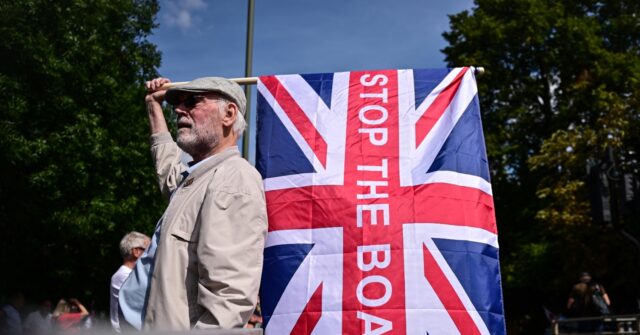British voters across the political spectrum are much more likely to hold strong views on immigration and even ethnic homogeneity than Americans, with 70 per cent of right-wing voters saying it’s bad for society “if white people decline as a share of the population”.
Britons have long been considered to be comfortably to the left of their American cousins on practically all political matters. While this remains largely true, new research shows that Britons from both the left and right are considerably more forthright than their American counterparts on immigration policy questions.
Voters for British right-wing parties are radically more likely to agree with statements such as “it is bad for society if white people decline as a share of the population” and “society is weakened by being made up of many different races, ethnicities, and religions”, the polling finds.
The remarkable results come from a preview of a forthcoming paper by the National Centre for Social Research, entitled UK and US Attitudes: Two Sides of the Same Coin? trailed in finance-focused British globalist-centre-left publication, The Financial Times. The organisation took questions already well polled and understood by U.S. pollsters and asked exactly the same of British respondents, giving a realistic side-by-side comparison.
With 2,000 respondents asked, it isn’t a mega-poll, but it is still twice the size of a typical UK political pollster’s sample.
It found the United Kingdom remains to the left of America on every national policy and social issue question — such as taxation and abortion among others — except for questions of immigration and diversity, at least suggesting that decades of British governments ignoring popular sentiment on border control has pushed the population rightward.
Some of the gaps in willingness to show agreement on some migration concepts between British and American respondents are vast, and all the more astonishing given that expressing some of the sentiments that seem to enjoy widespread support among the British would likely invite a police investigation in the UK, where there are no constitutional guarantees of free speech.
Asked whether they agree with the statement “We risk losing our national identity if we are too open to people from all over the world”, a massive 81 per cent of people who voted for either the Conservative Party or Nigel Farage’s Reform Party at the last General Election said they would agree, compared to 65 per cent of U.S. Trump voters. Among British Labour Party voters, there is no majority for this notion, but it is still striking that 34 per cent agree, compared to just 12 per cent of 2024 Kamala Harris voters.
Indeed, British left-wing voters are to the right of Kamala Harris supporters in every one of these metrics.
On the statement “It is bad for society if white people decline as a share of the population”, 70 per cent of UK right-wingers agree, a full 27 points ahead of Trump voters, who agreed 43 per cent of the time. On the left, 24 per cent of Labour voters said yes, while just 9 per cent of Harris voters agreed.
Asked whether they are “uncomfortable with people speaking a foreign language in public places”, 66 per cent of British Conservative and Reform voters agreed. Trump supporters do not share this sentiment as broadly, with just 47 per cent agreeing, followed by Labour voters at 28 per cent, and Kamala Harris supporters at 17 per cent.
Again, on ethnic homogeneity, a majority of right-wingers in Britain said they agreed that “society is weakened by being made up of many different races, ethnicities, and religions”. A majority of 52 per cent said that was the case, well over double the number of American conservatives who said they thought so, who came in at 19 per cent. Those Trump voters only came in a little ahead of British Labour supporters, who agreed 14 per cent of the time. Least of all were Kamala Harris voters, who agreed with statistically negligible frequency at three per cent.
The Financial Times cited Sir John Curtice, a renowned British psephologist and political scientist, who said the results once again underlined the new dividing lines in British politics. These lines, which had been over economic policy in past decades, now revolve around social issues, characterising the right as more concerned with sovereignty than fiscal probity. They share this with U.S. President Donald Trump, who said that they “think that Britain should run itself”.


















